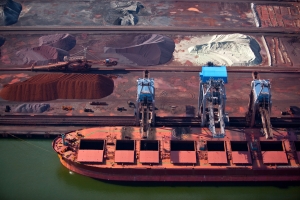


(Posted on 06/07/20)
Ports can play a pivotal role in the world’s decarbonization challenge and provide a blueprint for industries and governments to cut pollution and transition to a cleaner energy future. By 2050, the total electricity generating capacity for industrial* ports could increase more than tenfold. Renewable energy could account for at least 70% of the total electricity generation, compared to just 5% today.
This is one of the findings of DNV GL’s new study Ports: Green gateways to Europe - 10 Transitions to turn ports into decarbonization hubs. The study reveals that the expected deployment of offshore wind and the required grid enforcements to realize their connection will lead to an advantageous position for large industrial ports as a hub for renewable energy generation.
The report, made with input from Eurelectric, the sector association for the European electricity industry, also reveals that despite industrial production increasing almost 60% and cargo throughput growing 30% by 2050, energy efficiency measures and electrification could more than compensate for the growth in port activities, both in energy use and CO2-emissions. Additionally, the carbon intensity for port side energy use will almost halve.
However, for this to be realised, 10 Green Transitions will need to be made in and around ports. These transitions are:
The report also analysed smaller Transport Ports*. The findings show that without the Green Transitions, the ports energy use and CO¬2-emission will increase significantly, but that efficiency measures and electrification could more than half the total energy consumption. Electricity use will increase almost fivefold and in absolute terms, electricity will be almost on par with fuel oil consumption.
Regardless of size or function, the importance of ports in the wider decarbonization agenda cannot be underestimated. Today transport accounts for one-third of the overall EU CO2 emissions, with water transport making up 14%. It is estimated that due to CO2 targets imposed on vehicles, the relative contribution of water transport will increase significantly if emissions from water navigation are not tackled in time.
* Based on DNV GL’s model for a large European Industrial Port - this port is based on the average size of the 20 largest ports in Europe. It is mainly focused on bulk goods and containers. It has a large crude-oil and chemical industry cluster, co-location of power plants and a large potential for connecting offshore wind. We also modeled a smaller, mainly transport focussed port. The assessment of this port can be found in the report.
* Based on DNV GL’s model for a large European Transport Port- This port is one-tenth of the size of the large or average industrial port and represents the average size of a seaport in Europe. It has a limited industrial cluster, mixed container and passenger transport and no offshore wind connection potential
DNV GL is the independent expert in risk management and quality assurance, operating in more than 100 countries. Through its broad experience and deep expertise DNV GL advances safety and sustainable performance, sets industry benchmarks, and inspires and invents solutions.
With this year’s Rail Conference “Rail Freight Transport and Seaports”, a joint initiative... Read more
Asian Bulk Logistics (ABL Group) and ICG have jointly announced the successful completion of ABL&rsquo... Read more
Abu Dhabi based AD Ports Group, a leading global enabler of integrated trade, industry and logistics... Read more
The Executive Board of Hamburger Hafen und Logistik AG (HHLA) has appointed Patrick Krawutschke as Managing... Read more
Abu Dhabi based AD Ports Group, a global enabler of integrated trade, transport, industry, and logistics... Read more
This year marks a significant milestone in maritime innovation as Port Hedland, Australia, celebrates... Read more
Associated British Ports (ABP), the UK’s leading port operator, has announced the latest tranche... Read more
During the Investment, Labour, and Trade Promotion Programme in Japan (November 16–22, 2025),... Read more
AD Ports Group subsidiary Khalifa Economic Zones Abu Dhabi - KEZAD Group, the largest operator of integrated... Read more
Abu Dhabi based AD Ports Group, a global enabler of integrated trade, transport, industry, and logistics... Read more